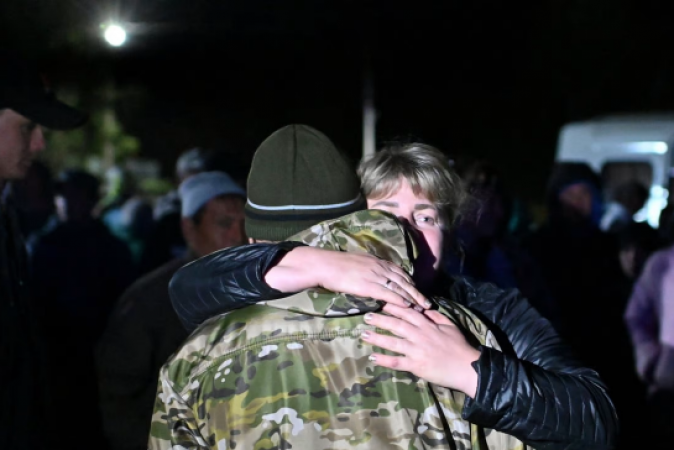
MOSCOW: Russian women are pressing on the Kremlin as they desperately try to protect their sons and husbands from the front lines in Ukraine in the latest sign of growing war unrest.
After Vladimir Putin ordered the calling up of 300,000 reservists on September 21, with officials paying attention, the scattered effort by wives and mothers gathered momentum.
Regional governors have met with activists and offered their assistance, and the Russian president is set to meet with them in person earlier this week.
Also Read: Zimbabwe presents a "majestic" $200 million project Parliament built in China
Putin's efforts to shield his population from the cost of the fighting are beginning to fail in some places as the war moves into its ninth month, and the Kremlin is racing to minimize the impact where it can.
The families of those called are being promised money and other benefits by the government, as well as guarantees that they will be well equipped and cared for.
There have been organized protests against sending relatives to the front in at least 15 regions, the largest of which is close to the Ukrainian border, according to information gathered by independent media outlet Verstka, one of the few covering the movement.
The families' demands are generally non-political and focused on ensuring that their men receive the right training, equipment and care while serving at the front.
Putin urged officials to ensure that concerns were addressed earlier this month and promised to "talk to the people themselves to get some feedback" on the matter.
Despite claims by activists that results so far have been limited, governors of some regions close to the Ukraine border have pledged to assist. Other officers categorically rejected the appeals, saying frontline soldiers were "alive and well".
Also Read: Europe titles the first astronaut with a disability
Ekaterina Schulmann, a political scientist and fellow at the Robert Bosch Academy in Berlin, said these men were not interested in ending the war; Rather, they wanted to improve the living conditions of the soldiers.
However, because of this, it is more difficult for the authorities to dismiss them or characterize those protests as acts of extremism or foreign influence.
According to opinion polls, the war's popularity has declined since its peak in the initial period, when the Ukrainian counter-offensive forced Russian troops to cede large areas of territory.
Concern grew when mobilization was announced, potentially resulting in half a million Russians leaving the country.
In Russia, mothers of soldiers have long been a political force, as activists fought to protect their sons from brutal treatment. The movement to repatriate troops sent to fight in the Chechnya region intensified in the 1990s.
This time a group claiming to speak for the families claimed supporters in 89 cities. The families' protests, which have attracted much attention on social media, have received little coverage on state television.
While none has been officially confirmed, videos of furious wives running towards the conflict zone to save their relatives have been widely shared on social media.
The wife of one of the conscripts claimed in a video appeal by Verstka on 9 November that her company commander had revealed that only 30 out of 200 men had managed to escape after a fire broke out in Luhansk, eastern Ukraine .
A day later, a group of 20 women on the Russian border with Ukraine promised in another video that they would go to the front lines to save their husbands, sons and brothers.
"If they don't come out and help us, we will go, including a pregnant girl," said one of them, noting that their relatives were tending to injured comrades due to the lack of body armor or helmets. were taking behind them.
Despite official mourning, the law is being strictly enforced. One group claimed that if one of its activists, a teacher, did not remain silent, the authorities would arrest her. Additionally, draftees are advised that their relatives should refrain from protesting.
On 22 November, a soldier from Siberia's Altai region, who made a video appeal to the governor for proper military gear and training for his unit, offered his explanation and thanked the authorities for providing it.
Also Read: FIFA WC:Japan stun four-time champion Germany in second shock
Please forgive us for jumping to conclusions in haste. We have everything we need," he claimed in a Telegram message shared by local officials.